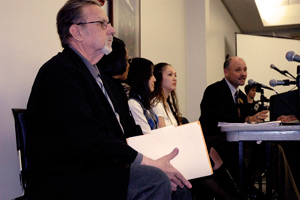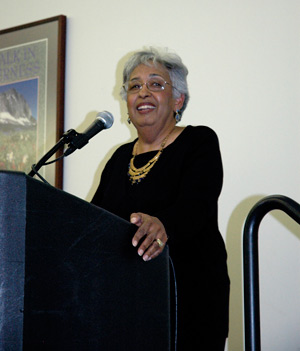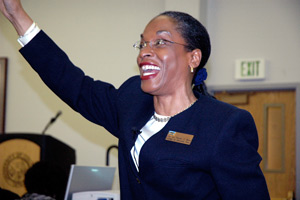University Relations
Communique
Brought to you by the UCCS Office of University Relations.
Volume 54, Issue 3
February 20, 2009
Black History Month celebration highlights role of Kansas teacher
Building on a quotation widely attributed to music mogul Jay-Z, UCCS faculty, staff and students joined in a celebration of black history and the 100th anniversary of the NAACP Tuesday night at the Lodge.
“Rosa Parks sat so that Martin Luther King could walk,” Rosemary Harris-Lytle, a UCCS alum and president of the local NAACP chapter said, repeating the phrase often attributed to Jay-Z. “Martin Luther King walked so that Barack could run. Barack ran so that we all can fly.”
More than 150 people heard from Harris-Lytle, La Vonne Neal, dean, College of Education, Ramon Noches, Nancy Todd-Noches, and a panel of UCCS faculty and community leaders about the values of diversity and inclusiveness.
“The NAACP is alive and well,” Harris said. “The NAACP was founded by a group of multi-racial freedom fighters 100 years ago. Today, we have 500 members in Colorado Springs and 250,000 members world-wide.”
Harris and Neal set the stage for Ramon Noches and Nancy Todd-Noches to explain the landmark case Brown vs. Board of Education and the role of Lucinda Todd, a plaintiff in the case and the mother of Nancy Todd-Noches.
With a series of Powerpoint slides that illustrated key aspects of the case, including rare original correspondence with national NAACP leaders, Ramon Noches traced his late mother-in-law’s life from her birth in a small Kansas mining town to becoming an integral part of the civil rights movement and later teaching in an integrated school. Lucinda Todd died in 1996 at age 93.
Initially a teacher in rural Kansas, Joplin, Mo., and later in Topeka’s segregated elementary schools, Lucinda Todd wanted the same opportunities for her daughter, Nancy, as were afforded to white children. A dispute over music education, initially offered only to children in Topeka’s white elementary schools, led to confrontations with school administrators and the city’s school board. It also put into motion the case known as Brown v. Board which ended segregation in the nation’s public schools.
“Brown was Rev. Oliver Brown whose name appeared first on the list of plaintiffs by virtue of alphabetizing the names of the plaintiff’s children,” Ramon Noches explained. “But it was Lucinda Todd – whose name appeared last – who made the difference.”
Nancy Todd-Noches added brief personal recollections of her family hosting prominent NAACP leaders of the day and attending many meetings as child where adults vigorously debated both segregation and legal strategy to end it.
The landmark case set into motion many of the civil rights efforts of the 1950s and 1960s as it effectively ended the “separate but equal” doctrine of the time.
“Rosa Parks sat so that Martin Luther King could walk. Martin Luther King walked so that Barack could run. Barack ran so that we all can fly.”

A panel of community and education leaders discusses diversity and inclusiveness during a Black History Month Celebration Tuesday in the Lodge.

Nancy Todd Noches, a plaintiff in the landmark case Brown v. Board of Education, talks about her experiences and those of her mother, Lucinda Todd, during a Black History Month Celebration Tuesday at the Lodge.

La Vonne Neal, dean, College of Education, welcomed more than 150 people to a Black History Month celebration Tuesday in the Lodge.
Communique is the online newsletter for UCCS faculty and staff. It is published weekly during the fall and spring semesters, monthly during the summer semester. Communique is sent to faculty and staff e-mail lists and, by request, to other e-mail addresses. Previous issues are available in the Communique Archives at www.uccs.edu/ur/communique/archives.html, and the current issue is always at www.uccs.edu/ur/communique. Suggestions and comments are welcome. Send ideas to ur@uccs.edu or call Tom Hutton, 262-3439.
View Current Communique
